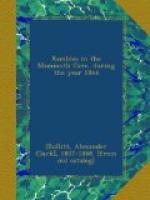to add strength and perhaps as an ornament. These
were of middling size, denoting feet of small size.
The shape of the moccasins differs but little from
the deer-skin moccasins worn by the Northern Indians.
The knapsack was of wove or knit bark, with a deep,
strong border around the top, and was about the size
of knapsacks used by soldiers. The workmanship
of it was neat, and such as would do credit as a fabric,
to a manufacturer of the present day. The reticule
was also made of knit or wove bark. The shape
was much like a horseman’s valise, opening its
whole length on the top. On the side of the opening
and a few inches from it, were two rows of hoops,
one row on each side. Two cords were fastened
to one end of the reticule at the top, which passed
through the loop on one side and then on the other
side, the whole length, by which it was laced up and
secured. The edges of the top of the reticule
were strengthened with deep fancy borders. The
articles contained in the knapsack and reticule were
quite numerous, and are as follows: one head
cap, made of wove or knit bark, without any border,
and of the shape of the plainest night cap; seven
head-dresses made of the quills of large birds, and
put together somewhat in the same way that feather
fans are made, except that the pipes of the quills
are not drawn to a point, but are spread out in straight
lines with the top. This was done by perforating
the pipe of the quill in two places and running two
cords through these holes, and then winding around
the quills and the cord, fine thread, to fasten each
quill in the place designed for it. These cords
extended some length beyond the quills on each side,
so that on placing the feathers erect on the head,
the cords could be tied together at the back of the
head. This would enable the wearer to present
a beautiful display of feathers standing erect and
extending a distance above the head, and entirely
surrounding it. These were most splendid head
dresses, and would be a magnificent ornament to the
head of a female at the present day,—several
hundred strings of beads; these consisted of very
hard brown seed smaller than hemp seed, in each of
which a small hole had been made, and through this
hole a small three corded thread, similar in appearance
and texture to seine twine; these were tied up in
bunches, as a merchant ties up coral beads when he
exposes them for sale. The red hoofs of fawns,
on a string supposed to be worn around the neck as
a necklace. These hoofs were about twenty in
number, and may have been emblematic of Innocence;
the claw of an eagle, with a hole made in it, through
which a cord was passed, so that it could be worn
pendent from the neck; the jaw of a bear designed
to be worn in the same manner as the eagle’s
claw, and supplied with a cord to suspend it around
the neck; two rattlesnake-skins, one of these had
fourteen rattles upon it, these were neatly folded
up; some vegetable colors done up in leaves; a small
bunch of deer sinews, resembling cat-gut in appearance;




